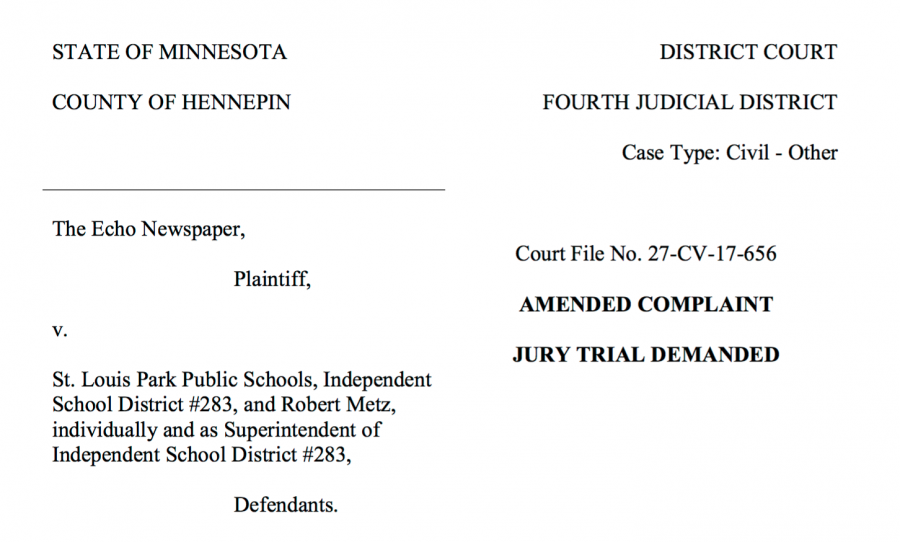Echo files suit against district
Requests footage from November incident
January 19, 2017
Updated Jan. 20: The PDF of Echo’s complaint has been updated to reflect a change in how the plaintiff is listed.
Echo filed a suit against the St. Louis Park school district Jan. 18, alleging the district failed to comply with the Minnesota Government Data Practices Act in withholding security footage from the Nov. 14 hijab incident.
Echo editors-in-chief Maggie Bahnson and Ethan Brown requested video footage and other information from the day of the incident, pursuant to the Minnesota Government Data Practices Act. The Echo Newspaper is listed as the plaintiff in the case.
“This action seeks to compel compliance with a request brought pursuant to the Minnesota Government Data Practices Act, Minn. Stat. § 13.01, et seq., for the purposes of obtaining access to the security video and other related data,” the lawsuit states.
Echo will update its coverage of the lawsuit as more information becomes available.




Noah Smith • Jan 19, 2017 at 1:26 pm
Good job guys! I’m glad you’re fighting for laws to be followed.
David Fhima • Jan 19, 2017 at 2:25 pm
Proud of the echo team…
Your rights matter only if you are prepared to defend them.
Jojo • Jan 21, 2017 at 9:11 pm
The data is private. It was recorded inside a public school, and that data identifies students whose actions and images are not public data. Technically, a TV news station cannot record inside a public school unless each student whose image is recorded has parental written permission for them to be recorded. In public school there is a thing called directory data, and parents must give permission for that to be public. Student data is protected by federal law. The MGDPA applies to all data collected, created, received, maintained or disseminated by any government entity. The MGDPA defines “government entity” as “a state agency, statewide system, or political subdivision.” The term “political subdivision,” for purposes of the MGDPA, includes counties, cities, school districts, special districts, boards, commissions, and district; as well as authorities created by law, local ordinance or charter provision. Yes, anyone can put in a claim for public data. But the person or organization requesting government data may request access to specific types of data or data elements, to specific documents or portions of documents, to entire records, files, or databases, or to all public data maintained by the entity. But this is not public data